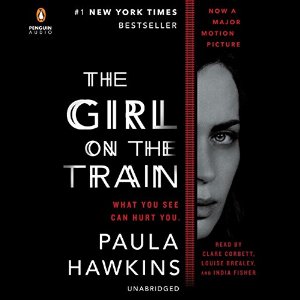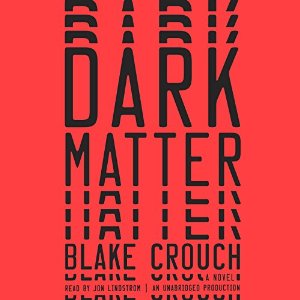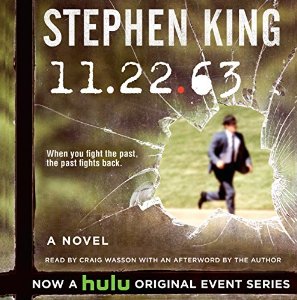A while ago I began a three-month trial subscription to Audible, a company that sells audio versions of books. Instead of staring at a page or screen and risking eye strain, you listen to a narrator read the book. I’d resisted the idea of audio books for a long time. When would I listen? I prefer to keep my attention on the road while driving. I don’t even listen to music.
Then inspiration struck.
I suffer from chronic insomnia. Most nights I struggle to fall asleep and then wake four hours later, my mind revving. It can take an hour or more of reading to lull my overactive brain. I wondered if listening to a book would help. It’s more passive. You can do it with your eyes closed. It would be like a return to childhood, listening to your parents read bedtime stories.
 I used my first Audible credit to buy The Girl on the Train by Paula Hawkins, a popular and widely praised suspense novel. I donned my ear buds and crawled into bed, tapped the “Play” button and began listening. A pleasant female voice with a British accent described lying under a tree, and within minutes I was asleep. Four hours later I woke up to another female reader with a pleasant voice and a slightly different British accent reading . . . I had no idea what. I shut off the book and promptly fell asleep.
I used my first Audible credit to buy The Girl on the Train by Paula Hawkins, a popular and widely praised suspense novel. I donned my ear buds and crawled into bed, tapped the “Play” button and began listening. A pleasant female voice with a British accent described lying under a tree, and within minutes I was asleep. Four hours later I woke up to another female reader with a pleasant voice and a slightly different British accent reading . . . I had no idea what. I shut off the book and promptly fell asleep.
Success!
But not really.
When bedtime came, I had no interest in revisiting The Girl on the Train. But I restarted it from the beginning and once again Reader #1 launched into her description of gazing up at the tree. As Reader #2 gazed out the window of a commuter train, I tuned out. I awoke somewhere mid story and shut off the narration. This time I didn’t fall back asleep. And I felt an aversion to plugging myself into The Girl on the Train. Instead I got up (much to the annoyance of my husband, who considers me to be his personal snuggle bunny) and stood in the kitchen reading an entertaining steampunk novel called The Black Orchid on my Kindle.
The third night I picked up my Kindle and wrote off the Audible experiment as a failure. But I didn’t cancel the trial membership and a month later a message arrived in my mailbox. I had another credit available. So I downloaded another book, Blake Crouch’s Dark Matter, a new science fiction novel.
 This time I listened only a few minutes before drifting off. In the middle of the night I woke up, skipped back several chapters, and picked up the thread of the story. When I fell asleep again, the hero, a physics professor, was leaving a Chicago bar.
This time I listened only a few minutes before drifting off. In the middle of the night I woke up, skipped back several chapters, and picked up the thread of the story. When I fell asleep again, the hero, a physics professor, was leaving a Chicago bar.
The following night he was kidnapped at gunpoint. Sleep ambushed me as the hapless professor walked naked and shivering into an abandoned power plant. I slept until morning.
Success!
A little too much success.
I couldn’t wait until bedtime for more. I went through the day plugged into my ear buds as the hero of Dark Matter discovers he’s been transported to a parallel universe and undertakes an odyssey, wandering from universe to universe to find his way home.
As soon as I finished Dark Matter, I exchanged The Girl on the Train for Stephen King’s 11.22.63, a thirty-hour listening extravaganza. Now I look forward to bedtime.
The takeaway from this experience?
Certain books don’t lend themselves to narration.
The Girl on the Train has THREE first-person narrators, and although the audio book employs three different narrators, the rhythm and tone of the prose stays pretty much the same. I won’t get into the question of whether multiple first-person narrators is a good idea—Hawkins has sold a gazillion more books than I have—but the technique doesn’t work for me as a listener. Add the story’s arty, oblique approach and it becomes even harder to follow. I suspect that reading the novel is far more satisfying.
Dark Matter has ONE first-person narrator and lots of dialogue and action. Crouch vividly describes the many universes that his hero explores. The details are fresh and concrete and succinctly described. Most of all, the reader never has to wonder what’s going on.
The reader makes a huge difference.
As a writer I’ve given readings of my own work, and as a teacher I’ve read the poetry and prose of other writers to my students. I have some idea of how difficult it is to read aloud. It requires talent and extensive training. An incompetent reader would no doubt ruin the whole experience.
The three Audible novels I’ve tried were major releases from mainstream publishers. Unsurprisingly, the readers in all of them are top notch. My favorite is Jon Lindstrom, who reads Dark Matter. He has an expressive voice and speaks the dialogue of every character in a distinctive way.
Audible at bedtime won’t work for everyone.
When I described my experience to my writing group, reactions were varied. One person, already an Audible subscriber, thought it was an interesting idea. Another shook her head. “I move around too much. I’d probably strangle on the cord of the ear buds.” Another person imagined herself swallowing the buds. And I guess a few princesses might have trouble sleeping with giant peas in their ears.
 Comprehension is poorer than with reading.
Comprehension is poorer than with reading.
I remember what happens in Dark Matter along with some especially striking details, but not much about how the hero moves through parallel universes in his box that turns into a corridor. Something about Schrödinger’s cat and a drug that suppresses key areas in the brain . . . Oh well, the important thing is that the contraption works.
The time travel in 11.22.63 is less of a problem. Stephen King sticks with how it works and doesn’t delve into why. It’s a mystery, a “rabbit hole.” At least so far. I haven’t finished the novel yet.
In spite of the drawbacks, bedtime stories work for me. It looks like Audible has a permanent subscriber. I could use some recommendations for my next book. If you listen to books on Audible or iTunes, I’d love to know about your favorites. Just leave a comment below.







